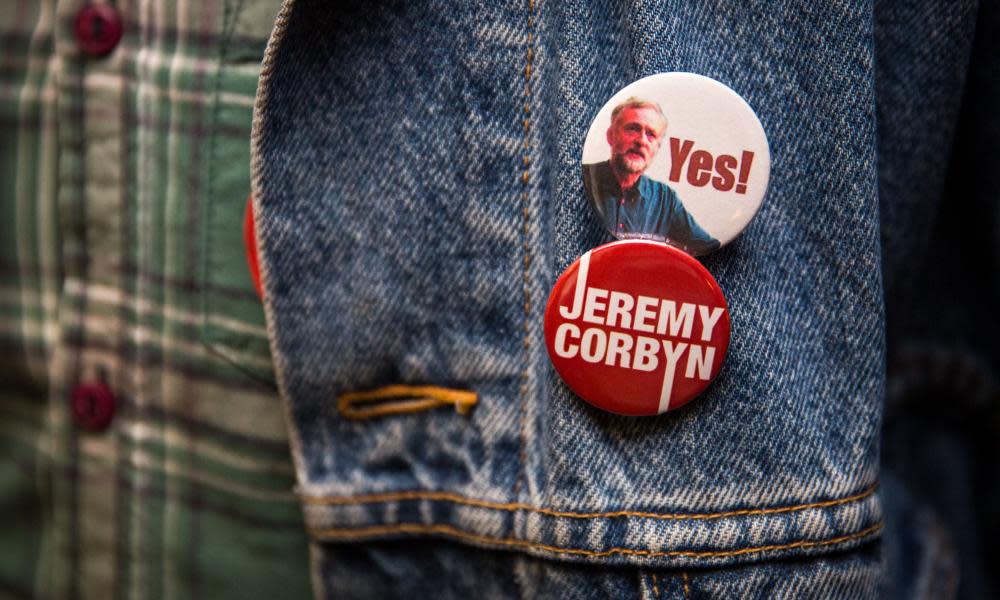Personal attacks on Corbyn will backfire on the Tories among the young | Charlie Brinkhurst-Cuff

“I apologise to mugwumps everywhere for inadvertently comparing them to Jeremy Corbyn,” Boris Johnson said on Good Morning Britain on Thursday, after calling Corbyn a “mutton-headed old mugwump” in a column that morning for The Sun. Although his choice of words may seem lighthearted, this was a tactical, cruel move. That much was clear on reading the rest of the column, which began “the biggest risk with Jeremy Corbyn is that people just don’t get what a threat he really is,” and continued in that vein. It helped remind me – and other young people too, I’m sure – that the Tories are still, at heart, the “nasty party”, as Theresa May once called them.
Of course, Johnson’s toxic, foppish humour will always appeal to the immature – whether they’re 18 or 68. And his language is especially captivating to a small upper-middle-class subset who were part of the debating society at Oxbridge and follow prime minister’s questions with unrestrained glee.
But it’s easy enough for young people to see that Johnson is a calculated and conniving politician. Despite his history of fluff-ups (remember the zip-wire?), it’s clear he thought very carefully before launching this pointed, personal attack on Corbyn. It appears to be part of a much broader, highly organised Tory strategy to target Corbyn and his shadow cabinet, which has included an attack ad focusing on Corbyn’s comments about defence, and Theresa May crowing in PMQs about Diane Abbott linking on Twitter to the page “I like Corbyn, but”. The prime minister went on: “Even his own supporters know he’s not fit to run this country. They are right to be worried. Unable to defend our country, determined to raise taxes on ordinary workers, no plans to manage our economy. Even his own supporters know he’s not fit to run this country.”
I suspect young voters are the least likely to respond well to this type of rhetoric, this straightforwardly negative and personal campaigning. In our teenage years we were bombarded with anti-bullying messages which usually had a focus on name-calling, and when we went to university, or started work, those messages really kicked in. It’s especially uncool in my age group, people in their twenties, to denigrate your peers; to ridicule someone for being passionate or intelligent.
Johnson, May and other cabinet ministers risk appearing like unpopular school bullies. The Tories know their approach will be welcomed by those already set in their view that Labour is an unreliable mess. In many ways, making Corbyn a figure of mockery is a good move because if he protests against the name-calling, as he has done, he risks looking like a cantankerous old geezer; if he doesn’t respond then he’s weak; and if he attacks back he’s just as bad as them (and that really isn’t his style). But despite the lack of options on offer to Corbyn, this still doesn’t mean young people will fall into the trap.
In the 2015 general election, 43% of 18- to 24-year-olds voted for Labour compared with 27% who voted Conservative, and a recent YouGov poll found Corbyn would win the election if 18- to 40-year-olds were the only ones going to the polls this time around. Labour appeals to the young and idealistic for good reason. We may have been born after the time the Tories decided “If you want a nigger for a neighbour, vote Labour” was a good slogan, but our parents haven’t forgotten – and they’ve told us all about it. And there is more recent history that many of us are aware of – such as when Johnson referred to black people as “piccaninnies” with “watermelon smiles”, and when May voted against the repeal of section 28, as well as against civil partnerships and reducing the age of consent for gay people.
Young people have been unfairly targeted by majority Tory governments for the past seven years, and when Tory MPs behave with arrogance and vindictiveness it reminds us of how we’ve been treated. It might, in fact, make it easier for us to empathise with Corbyn. Over the last week, the grime stars JME, Skepta, Akala, AJ Tracey and Stormzy have all come out in support of Corbyn, with a very young, very active social media fanbase of millions between them – while more than 100,000 people under the age of 25 registered to vote in the three days after the snap election was announced. Johnson, May and their colleagues should tread carefully. If they keep up their nastiness, young people could pose a genuine threat to their majorities.

 Yahoo News
Yahoo News 
